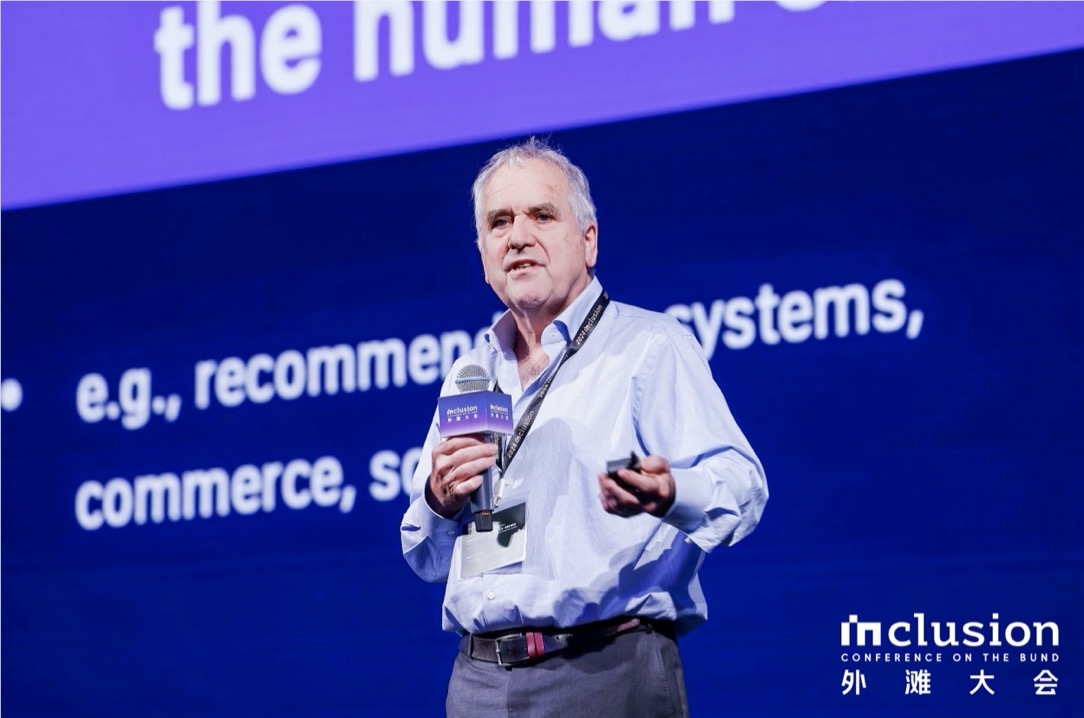"The lack of attention to collectivity, uncertainty, and incentive mechanisms is what is missing in the current discussions on artificial intelligence." On September 5th, at the opening main forum of the 2024 Inclusion·Bund Conference, Michael I. Jordan, a leading figure in machine learning and a member of the National Academies of Sciences, Engineering, and Medicine, shared his latest insights on artificial intelligence after a year. Jordan believes that for AI to be applied in industries, it needs to form a collective that collaborates; to build a collaborative AI system, it is essential to introduce the economic perspective of "incentives."

At the main forum of the Bund Conference, Michael I. Jordan once again addressed the issue of uncertainty in artificial intelligence. "ChatGPT, are you sure what you just generated is correct?" He pointed out that current AI systems struggle to express what knowledge they have truly learned and lack the ability to convey their level of certainty. In contrast, humans excel in dealing with uncertainty, especially when collaborating collectively.
Therefore, Jordan suggests that not only should individual devices possess certain intelligence, but AI should also be manifested through collaboration at the system level. He noted that simply integrating human intelligence into superintelligent computers is insufficient. Modern information technology applications in fields such as healthcare, transportation, fintech, and business require collective, decentralized intelligent systems.
Jordan further explored the relationship between uncertainty and collectivity. He noted that humans can better handle uncertainty when collaborating collectively, but how to enable current AI systems to possess similar collective collaboration capabilities remains a key unresolved issue. He believes that the perspective of microeconomics is a missing piece in current AI research.
"Incentive mechanisms" are key factors in market economies and collective intelligence. "AI has vast amounts of data, but some of it does not generate value; it is through designing incentive mechanisms that AI agents can be driven to contribute and collaborate." Jordan proposed the "Three-Layer Data Markets" model, where users, platforms, and data buyers form a closed loop through "selling data," "buying data," and "providing services." He emphasized that data buyers, i.e., enterprises, can combine "data and services" to establish incentive mechanisms with users, thereby bringing them real value.
In this regard, Jordan cited the theory of statistical contracts, a new theory that combines statistics and economics. In contract theory, agents have private information, and principals form a market where data and services promote each other through incentive mechanisms, maintaining a balance of interests between supply and demand.
For example, airlines have "business class" and "economy class," where airlines as principals can offer different prices based on the different willingness to pay of agents without needing them to disclose their personal information. Given the increasing global regulatory focus on data privacy over the past decade, he also suggested, "We can further enhance user utility by imposing higher requirements on low-cost platforms through non-uniform privacy demands."

Artificial intelligence, as an emerging engineering field, is connecting humans through large-scale systems in innovative ways. Its development is akin to the rise of chemical engineering in the mid-20th century and electrical engineering at the end of the 19th century, the former based on fields like chemistry and fluid dynamics, and the latter on technologies like electromagnetism and optics. AI systems are built on the reasoning, algorithmic, and economic ideas of the past 300 years of human history, and they need to be aimed at human welfare. Jordan cautioned, "But AI is being placed within those unreflective, naive old visions, and its rise and development are being distorted."
Professor Michael I. Jordan is a pioneer in the field of machine learning, having established connections between machine learning, probability, statistics, and graphical models, laying the mathematical and computational foundations for machine learning. He has received numerous awards, including the IEEE John von Neumann Medal, the International Joint Conference on Artificial Intelligence Outstanding Research Award, and the 2022 First World Laureates Association Award.
The 2024 Inclusion·Bund Conference was held from September 5th to 7th at the Shanghai Huangpu Expo site, featuring one opening main forum and 36 open insights forums. Recently, the authoritative media outlet AsiaTech, which has long focused on global technological trends, named the Bund Conference as one of the "Four Most Anticipated Global Innovation Tech Conferences in the Second Half of 2024."









